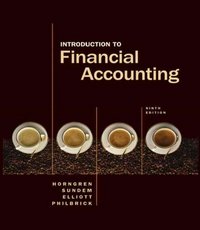Question
YOUare recruited by a large and prestigious financial planning firm which is listed on the ASX. You are paid a modest base salary (covers basic
YOUare recruited by a large and prestigious financial planning firm which is listed on the ASX. You are paid a modest base salary (covers basic living expenses), plus an incentive bonus based on the revenue generated for the firm by your clients. The more revenue you generate the more you will be paid. To meet shareholder pressure for results the firm has a policy to "move on" 10% of all financial planners every year - the financial planners who generate the least revenue - and replace them with planners "who are hungry for success". The pressure to succeed is enormous. In a socially connected world the industry understands that planners who leave your firm are the "bottom 10%ers".
Your firm's main product is to provide financial planning services. The firm has established working relationships with several boutique investment management businesses. Many of these boutique managers have outperformed the market. Planners are free to recommend either "mainstream" investments and/or the "boutique" investment products. Your manager explains that the firm's "boutique relationships" differentiates it from competitor financial planners and provides a marketing advantage. He also notes the "top 10%ers" almost always provide "boutique heavy" recommendations while the "bottom 10%ers" typically make more "mainstream" recommendations. You hear on the office grapevine that the founder of your firm went to the same university as many of the founders of the boutique firms.
You're working hard to establish yourself in the firm. One day a client comes to meet you. They are modestly successful, and have a severely disabled child. They are concerned to provide for their child's needs "after they are gone". At this stage it appears the child will never be able to work and will require constant attention to care for his needs. There is considerable ongoing research into their child's condition and they maintain some hope that their child will live a productive and happy life. However, they feel that whilst they will "hope for the best, they must prepare for the worst". You are aware of an investment product promoted by one of your firm's "boutique partners" that has an investment element combined with an insurance option. The product has high management fees. If your client takes this product the revenue it will generate for your firm will mean you sit well above average in terms of financial planning "contribution to firm goals".
As you research the boutique investment/insurance product you can see that while it is very effective it is also quite straight-forward. With some coaching your clients could manage this investment/insurance arrangement on their own, and save thousands of dollars each year. As you learn more about the condition of your clients' child you realise there is a significant community of people suffering from this and related conditions. It occurs to you that there could be a lucrative business opportunity providing a financial planning service to the families of this community, which would include this investment/insurance product as a core feature. You could charge a premium financial planning fee and provide the investment/insurance product for free to your clients.
Using the Baird decision making model to to reach and justify a responsible ethical judgement in terms of what you ought to do in this situation. (refer to APES110 AND/OR FASEA ALONG WITH consequential, non-consequential and agent centre theories)
Step by Step Solution
There are 3 Steps involved in it
Step: 1

Get Instant Access to Expert-Tailored Solutions
See step-by-step solutions with expert insights and AI powered tools for academic success
Step: 2

Step: 3

Ace Your Homework with AI
Get the answers you need in no time with our AI-driven, step-by-step assistance
Get Started


